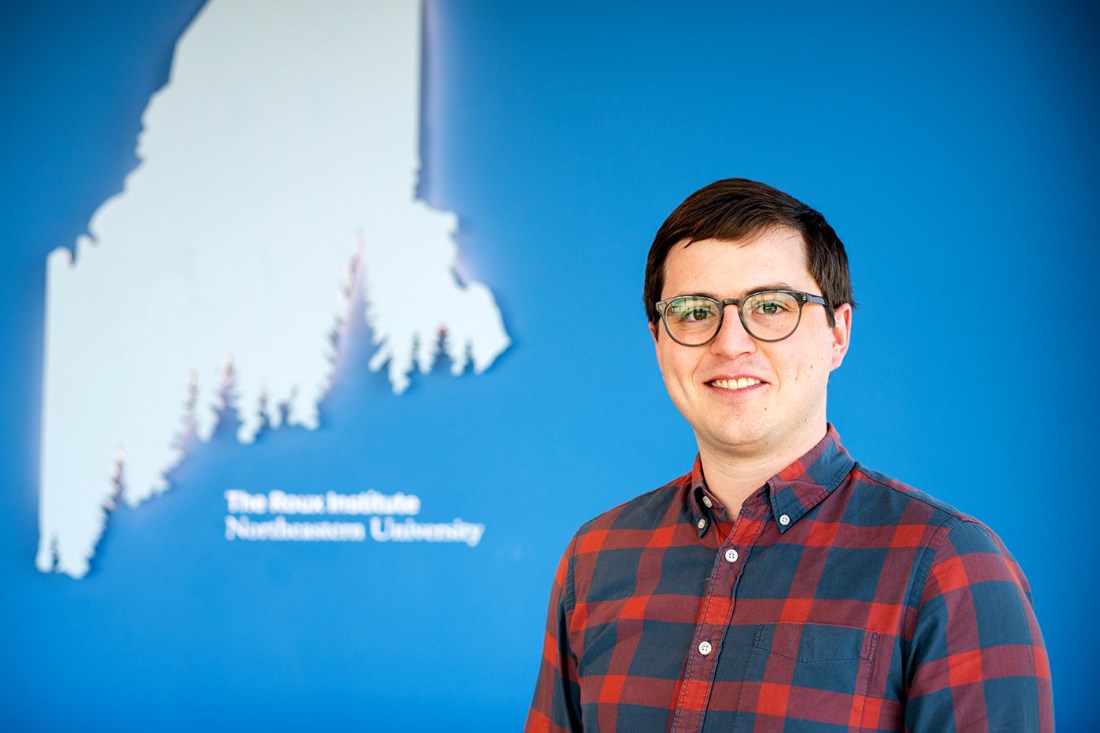Roux Institute Alfond Scholar uses data to make environmental policy impacts in Maine

Philip Mathieu has always been curious.
Growing up in Maine and New Hampshire, that curiosity is what led him to study physics and eventually find a passion in environmental work. It’s also what led him back to Maine, where he is currently getting his master’s degree in data science at the Roux Institute at Northeastern University in Portland.
The path from physics to environmental policy to data science might seem strange, but it’s all connected, Mathieu, class of 2024, says. It’s only at the Roux Institute that he was able to find a way to tackle the problems of today with the tools of tomorrow, putting his newfound skills to use on his passion for the environment and humanity’s impact on it.
“What I was pitched [at Roux Institute] was the opportunity to rather than do an environmental degree and be a person on my team who could also write code, be the person who was doing a coding degree and … working on a lot of environmental projects,” Mathieu says. “That was a compelling argument for applying to the Roux and has very much borne true in my experience at the Roux.”
Through work with environmental nonprofit Sierra Club Maine, a co-op with Portland-based environmental engineering company Kelson Marine Co. and service on the Portland Rent Board, Mathieu is already using the skills he’s learned at the Roux Institute to improve and impact his community.

Mathieu says the Roux Institute has empowered him to put those skills to work in real-world settings and with employers who are pushing the boundaries in high-growth fields. And his scholarship through the Alfond Scholars Initiative, backed by the Harold Alfond Foundation, has played an invaluable role.
With $100 million in scholarships, the Alfond Scholars Initiative offers highly flexible graduate program opportunities for people looking to advance their careers –– and for companies looking to find the next generation of talent in areas like analytics, data science and bioinformatics.
“For someone like me, who was coming out of a full-time job and didn’t necessarily want to give that up right away, it meant that I had a lot of flexibility in figuring out how to budget for my masters program and not having to put down projects like Sierra Club,” Mathieu says.
As an undergraduate student at Brown University, Mathieu had spent some time researching astrophysics, but quickly realized he “cared a lot more about the problems that were immediately around me than the problems that were a couple billion light years away.” That focus on the problems of today infuses all of Mathieu’s work.
It led him back to Maine to work for the Ecology School, a Saco-based organization that specializes in teaching middle school age students about the environment, and the Cape Elizabeth Land Trust, which focuses on conserving and protecting marshes, farmlands and woodlands. It also led him to realize that “people who have that passion [for the environment] and also have technical skills to get work done are really valuable.”
“There are a lot of very real issues that are happening right now that could benefit greatly from having someone that has really strong data literacy,” he says.
As he started looking for graduate programs that could help him take his technical skills to the next level, Mathieu realized most programs would require him to leave Maine, something he wasn’t ready to do. Then he found the Roux Institute.
“It really was a no-brainer to do the program at the Roux once I understood what the program looked like because it meant that I didn’t have to make any sacrifices in terms of the type of education, the quality of the instruction, the opportunities in terms of having such a large network to work with through Northeastern,” Mathieu says. “And I could still put down my roots and, as I was in the program, already be seeing the impact I was having in the city that I live in.”
Mathieu is still setting down roots, but he has already had an impact. He turned volunteer work with Sierra Club Maine, a chapter of the grass-roots environmental organization, into a Roux-approved internship and independent project.
By analyzing Maine on a census block by census block level, Mathieu helped map how far, on average, different communities were from the closest public park or conservation land. He then used data taken from Justice40, the Biden administration’s environmental justice initiative, to understand which communities are historically disadvantaged. Together, the two datasets showed that communities with some history of inequality are 24% less likely to have access to conservation land within walking distance.
“The big takeaway is we’re not trying to say, ‘Exactly this many Mainers don’t have access to green space,’ but what we can say is there was a statistically significant difference and that suggests there might be ways we can be more targeted in our state programs or provide more assistance,” Mathieu says.
Mathieu has also taken his data science skills and applied them as a member of the Portland community. Since October 2022, he has served on the Portland Rent Board, which creates an annual rental market report that, ultimately, gets sent to Portland City Council and has the potential to inform meaningful policy initiatives. Mathieu says the skills he acquired through the data science program helped him play an invaluable role in analyzing a lot of rental data more quickly than city staff usually has the time to do.
“It really told us that rents did indeed go up but also helped us understand how units that are subject to rent control change versus how units that are not subject to rent control change,” Mathieu says of the report, which has been covered by the Portland Press Herald.
Mathieu is currently wrapping up a co-op with Kelson Marine Co., which designs offshore structures like seaweed farms and wind, solar and tidal energy projects. And in his final semester at the Roux Institute, Mathieu will be doing his capstone project with Med Rhythms, a Portland-based medical therapeutic company and Roux partner. His work will involve helping the company use data to develop new ways of improving patient assessment and treatment.
“It’s very funny to try to imagine an alternative world where the Roux doesn’t exist and what I would have done because I don’t know,” Mathieu says. “Being able to make the choices that are right for my career and having Northeastern fit right into that was really cool.”
Cody Mello-Klein is a Northeastern Global News reporter. Email him at c.mello-klein@northeastern.edu. Follow him on X/Twitter @Proelectioneer.






